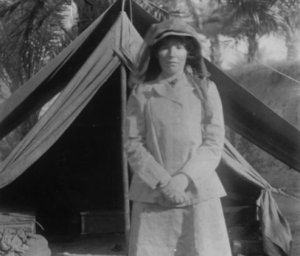Open University creative writing PhD student Rebekah Lattin-Rawstrone, a distant relative of explorer, archaeologist, writer and diplomat Gertrude Bell, delves into history to discover the circumstances leading up to the overdose that cut short the life of a brilliant woman.
In the centenary year of the founding of The Iraq Museum, Rebekah’s studies into the unusual British woman who created the institution show she was far from the traditional woman of the time.
She was the first woman to graduate from Oxford University with a first-class degree in modern history; spoke six languages; was an archaeologist; extensive traveller of the Middle East and became a diplomat for the British government.

Gertrude Bell in Iraq. She spoke six languages
Yet this educated woman from a privileged background, who had the trust and ear of many high-profile men in government, became a forlorn figure towards the end of her life.
Rebekah says the Hollywood version of Gertrude is…
“poor Gertrude – never got married – a kind of female version of Lawrence of Arabia with tragic love affairs”.
But her research points to a much more complex woman – one who had strong relationships with female friends yet found others “frustrating” particularly those living with their husbands in the lands known as Mesopotamia, now Iraq, Kuwait, Turkey and Syria, who failed to learn Arabic and take part in the world they were in.
Rebecca said:
“I think it’s easy for people to say she hated all women, but I don’t think that was true. I think she just had really high expectations of people and to some extent I think she’d been surrounded by some quite amazing women in her life. Including her stepmother.”
Rebekah says she often seemed to prefer the company of men although had significant friendships with women, including successful novelist, poet and journalist Vita Sackville-West, and her own lady’s maid Marie Delaire, but a fulfilling romance with the opposite sex had always eluded her.
For a better insight Rebekah tells of Gertrude being just three when her mother died a month after giving birth to her brother Maurice and as a result she became very close to her father, Sir Hugh Bell, the director of Bell Brothers’ steelworks at Middlesbrough and director of the North Eastern Railway.
He married Florence Bell when Gertrude was eight – a well-known playwright and author – who had two more daughters and a son.
Breaking the mould
Gertrude broke the more traditional mould of women. Her achievements were incredible: she mapped and explored the Middle East; became highly influential in British-Empire policy making because of her knowledge of the region and its people and was a key player in the nation building of what became known as the Kingdom of Iraq.
In later years, despite those achievements, her opinion was no longer valued by men in power; her attempts at romance had been rejected; she remained unmarried, and she became very ill and frail with lung problems, possibly due to her addiction to smoking, a habit very unusual for women then.
Her life has so fascinated Rebekah that she’s writing a novel, as part of her studies, based around the last day of her life.
Rebekah said:
“She was endlessly unlucky in love. She kind of proposed herself to King Faisal’s major advisor, Kinahan Cornwallis, who went on to become the British Ambassador to Iraq in the 40s during the Anglo-Iraqi war.
“He was recently divorced, but so much younger than her. It was kind of ridiculous and I don’t think he was ever going to accept her, but they were good friends.
“I think she thought she could be useful to him in the way that people perceived a wife might be. So, yes, I think that was also a disappointment.”
Of her death she says this:
“I think it’s pretty much accepted that Gertrude died of an overdose and that it was suicide but for quite a long time people debated this. My novel explores why she might have killed herself.
“Dial was quite a common sleeping pill that she was taking and was one of those things that doctors prescribed all the time but quite a lot of people used it to end their lives, so they stopped prescribing it.”
Rebekah says the last time Gertrude visited England to see her step mother was the summer before she died. She believes doctors had advised her not to return to Baghdad, where she lived, for the sake of her health.
Rebekah said:
“Her health was dragging her down, she wasn’t really in the political world anymore in a way that she was when she was younger and I think that was difficult for her. I don’t think she felt very useful anymore.”
She ignored the medical advice. She died at the age of 57 in Baghdad, just a few days short of her birthday in 1926, due to an overdose of Dial sleeping pills.
Main picture: Shutterstock
Picture of Gertrude: Bell (Gertrude) Archive, Newcastle University Library



